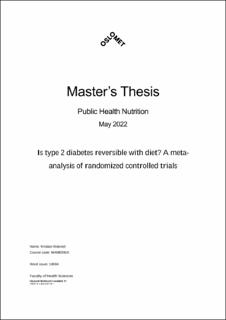| dc.description.abstract | Introduction: Type 2 diabetes mellitus (T2DM), defined by HbA1c values above 6.5% (48 mmol/mol), and it’s precursor prediabetes, defined by HbA1c values above 5.7% (39 mmol/mol), is a major health challenge worldwide. The prevalence of both T2DM, and prediabetes which is one of the main criterias for metabolic syndrome (MetS), has risen dramatically since the 1960’s with the introduction of industrialized food processing. Much like obesity, which it has a high correlation with, T2DM is fundamentally due to excessive intake of poor-quality food eventually overloading the cells with energy. The aim of this meta-analysis is therefore to examine the possibility and efficacy of treating T2DM and its precursor through diet, evident by remission or large reductions in HbA1c, by including Randomized Controlled Trials (RCT’s) of patients with T2DM or MetS.
Methodology: A systematic search was performed on PubMed of RCT’s including (1) patients with T2DM/MetS or relevant conditions, (2) HbA1c measured and above 6.5% (T2DM) or 5.7% (MetS/prediabetes), (3) any type of dietary intervention, including fasting, (4) and primary studies only. The efficacy of dietary interventions on glycemic control (HbA1c) were assessed by pooling data from each included RCT. Studies focusing on exercise, drugs, or surgery that affects the metabolism (e.g., bariatric surgery) were excluded. Risk of bias was assessed based on the Cochrane Handbook.
Results: Of a total 652 studies screened, 51 studies were included in the analysis (a total of 3281 patients). The intervention diets varied greatly in design and appeared more effective at lowering HbA1c than the comparator diets (SMD, -0.61; 95% CI, -0.76 to -0.47; p < 0.00001) (Figure 4). Analysis of studies with better adherence (total of 1509 patients) showed a significantly greater reduction in HbA1c compared to the main analysis (SMD, -0.80; 95% CI, -1.00 to -0.59; p < 0.00001) (Figure 5). Remission occurred in 17 out of the 51 studies. Limitations of the evidence was minimal as the Risk of Bias assessment was acceptable.
Conclusion: An intervention diet (typically low-carb, high-fiber, low-GI/GL, keto) was more efficacious at improving glycemic control in patients with T2DM or MetS than comparator diets (typically low-fat or hypocaloric diets). A recurring factor in the diets producing good results seems to be the elimination of processed food, especially processed carbohydrates. Based on observations made in this meta-analysis, reversing T2DM and prediabetes with diet alone is both possible and practicable even with high HbA1c values. | en_US |
